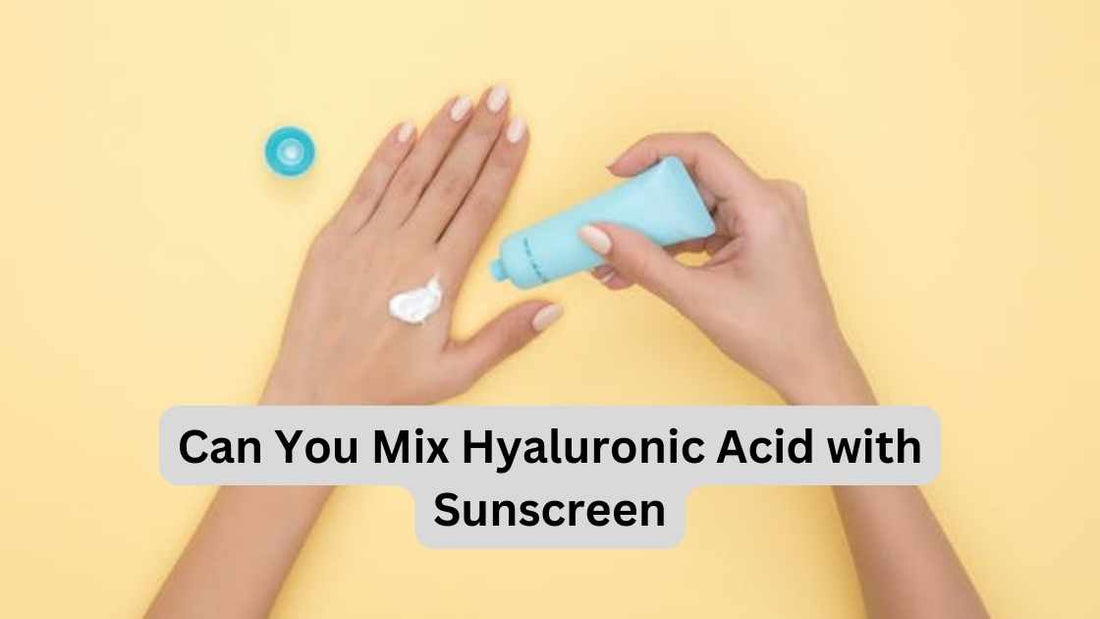
Can You Mix Hyaluronic Acid with Sunscreen
Share
Safe Skincare Combinations

The good news for skincare enthusiasts is that hyaluronic acid and sunscreen can indeed form a harmonious pair. Hyaluronic acid's unique ability to moisturise the skin without leaving it greasy makes it an excellent precursor to sunscreen application.
It provides a base of hydration, which is essential for maintaining a protective barrier against environmental aggressors.
Daily application of sunscreen with an effective SPF is critical for shielding the skin from sun damage, and when used in combination with hyaluronic acid, it ensures that the skin remains both safeguarded and well-hydrated throughout the day.
Incorporating both hyaluronic acid and sunscreen into a skin care routine does not need to be complex.
The application order matters to maximize the efficacy of both products. Typically, hyaluronic acid should be applied to clean, slightly damp skin, allowing it to absorb and lock in hydration.
Following up with a sunscreen that contains antioxidants can provide an added defence against free radicals while ensuring the skin's surface is armed with SPF protection. This routine ensures skin remains moisturised and fortified against UV-induced damage.
Compatibility and Benefits of Hyaluronic Acid With Sunscreen
In the realm of skincare, combining hyaluronic acid and sunscreen has proven to be particularly effective in maintaining skin hydration while ensuring adequate sun protection.
Understanding Hyaluronic Acid and Its Role in Skincare
Hyaluronic acid is revered for its exceptional moisturising properties. As a humectant, it attracts moisture and helps to hydrate the skin, benefiting the complexion by enhancing skin cell turnover and collagen production.
This hydration allows the skin to appear more plump and youthful, mitigating the visibility of wrinkles and aiding in the ageing process.
The Importance of Sunscreen in Daily Skincare
Sunscreen is indispensable in skincare, safeguarding skin from harmful UV damage. Sun protection is critical not only in the context of cosmetic concerns but also for preventing more serious skin conditions.
Regular use of sunscreen helps to maintain the integrity of skin cells, which contributes to overall skin health and longevity.
Benefits of Mixing Hyaluronic Acid With Sunscreen
The fusion of hyaluronic acid with sunscreen is akin to a match made in heaven. Hyaluronic acid enhances the efficacy of sunscreen by ensuring that the skin is well hydrated, thereby providing a more even canvas for sunscreen application.
This combination also means that the skin's moisture is replenished, which is essential when using products like retinol, known for increasing sun sensitivity.
Additionally, antioxidants in many sunscreens can work synergistically with the vitamin C often found in hyaluronic acid serums, offering further protection against free-radical damage while promoting hydrated skin.

We stock 500ml hyaluronic acid serum in our UK store, order yours in the link above
Application and Potential Side Effects
Meticulous application and awareness of side effects are crucial for integrating hyaluronic acid with sunscreen into a skincare routine.
This section outlines how to correctly apply these products to maximise benefits and mitigate adverse effects.
Correct Application Techniques for Efficacy
To effectively use hyaluronic acid with sunscreen, one should start by cleansing the skin with a gentle cleanser to remove impurities. Hyaluronic acid should be applied to damp skin to promote better absorption.
After giving the hyaluronic acid a few moments to penetrate the skin, sunscreen can be applied on top.
It is essential to use a broad-spectrum sunscreen with an SPF of 30 or higher. This layering technique ensures that the skin is hydrated and protected against UV damage.
Possible Side Effects and How to Avoid Them
Hyaluronic acid is generally well-tolerated, but combining it with other skincare products like retinoids may increase the risk of skin irritation or dryness.
To avoid these side effects, it is recommended to gradually introduce new ingredients into a skincare routine and to patch test products before full application.

Common signs to watch for include redness, peeling, breakouts, and inflammation. For individuals with sensitive skin, seeking out formulations specifically designed for sensitivity can help minimise potential irritation.
Professional Advice and When to Consult a Dermatologist
Consultation with a dermatologist is advisable when integrating new ingredients into a routine, especially for those with concerns like acne, sensitive skin, or age-related issues.
If adverse reactions occur, such as persistent redness or irritation, professional guidance should be sought. A dermatologist can provide tailored advice and may suggest alternative skincare products or a modified routine to ensure compatibility and address individual skin concerns.
